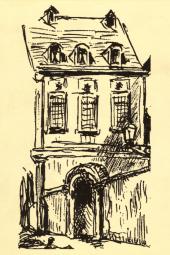The Academy Council of 6 February 1991 set up the following rules for the Koyré medal and the prize for young historians. The Koyré medal is awarded for a scholar’s career contribution rather than for a particular achievement. The candidate needs not to be a member of the Academy. Nomination of a Koyré medallist must be made in writing by a member of the Academy. The Council will choose the medallist via a mail ballot repeated until an absolute majority is attained. The awards will take place every two years, in odd years, and the medals will be delivered during the general assemblies of the Academy. The prize for young historians will be decided and awarded on the schedule that applies to the Koyré medallist. The prize rewards a first work in the history of science. Candidates can put themselves forward or be nominated by a member of the Academy. In either case the case must be submitted in writing and the work proposed for the prize sent to the Academy. The Council will decide the winner at one of its regular meetings by a majority vote of the members present. The prize will consist of a diploma and a cheque, the amount of which may vary from time to time.
1. Recipients of the Koyré medal:
1968 − D.T. Whiteside for the first two volumes of his edition "The Mathematical Papers of Isaac Newton" (Cambridge, 1967-1968).
1971 − A.P. Yushkevich and his collaborators for the four-volume work "History of the Nation’s Mathematics [in Russian]" (Moscow and Kiev, 1964-70); B. Suchodolski and his collaborators for the two-volume work "History of Polish Science [in Polish]" (Warsaw, 1970).
1974 − L. Geymonat for the four-volume work "Storia del pensiero filosofico e scientifico" (Milan, 1972).
1981 − M. Clagett for his four-volume "Archimedes in the Middle Ages" (Madison, Wisconsin, 1964 to Philadelphia, 1980).
1986 − C.C. Gillispie and his collaborators for the "Dictionary of Scientific Biography" (New York, 1970-1980).
1989 − J.D. North for his book "Chaucer’s Universe" (Oxford, 1988).
1991 − R. Rashed for all his writings.
1993 − W. Shea for all his writings.
1995 − Juan Vernet, Julio Samsó and the school of historians in Al-Andalus.
1997 − René Taton for all his writings.
1999 − John Heilbron for all his writings.
2001 − Izabella Bashmakova and Christian Houzel for all their writings.
2003 − "Storia della scienza", initiated by Vincenzo Cappelletti.
2005 − Guy Beaujouan for all his writings.
2007 − Ekmeleddin Ihsanoglu for his writings on Ottoman science.
2009 − ESA History Project, directed by John Krige and Arturo Russo.
2011 − Brigitte Hoppe for all her writings.
2013 − D. King for all his writings.
2015 − Edition and translation in French of Copernicus' "De revolutionibus orbium coelestium" (M.-P. Lerner, Ph. Segonds, J.-P. Verdet and their collaborators).
2017 − Robert Fox for all his writings.
2019 − Liu Dun for all his writings.
2021 − Christine Phili for all her writings.
2023 − Jed Buchwald for all his writings.
2025 − Roderick Home for all his writings.
2. A prize for young historians was awarded to: 1968 − Serge Demidov for his memoir "Diffusion, extension, and limits of the axiomatic method in modern science, after the example of geometry".
1986 − Christoph Meinel for his writings in the history of chemistry.
1989 − William Newman for his critical edition of the "Summa perfectionis" of Pseudo-Geber (published in 1991 in Collection de Travaux of the Academy, n° 35).
1993 − Baudouin Van Den Abeele for his book Les traités latins de fauconnerie, published as "La Fauconnerie au Moyen Âge. Connaissance, affaitage et médecine des oiseaux de chasse d'après les traités latins" (Klincksiek, 1994).
1995 − Marco Beretta for "The enlightenment of matter, the definition of chemistry from Agricola to Lavoisier" (Science History Publications, 1993).
1997 − Marie-Madeleine Saby for "Les canons de Jean de Lignères sur les tables astronomiques de 1321".
1999 − Andrea Breard for "Recréation d’un concept mathématique dans la pensée chinoise"; Jean-Pierre Sutto for his study on Maurolyco.
2001 − Antonella Romano for "La contre-réforme mathématique, constitution et diffusion d’une culture mathématique jésuite à la Renaissance" (Rome, Ecole française de Rome, 1999); Hiroshi Hirai for "Le concept de semence dans les théories de la matière à la Renaissance, de Marsile Ficin à Pierre Gassendi" (De Diversis Artibus 72).
2003 − Alberto Jori for "Aristotele" (Milano, Bruno Mondadori, 2003).
2007 − Harald Siebert for his work on Athanasius Kircher: "Die groe kosmologische Kontroverse. Rekonstruktionsversuche anhand des Itinerarium exstaticum von Athanasius Kircher SJ (1602-1680)" (Franz Steiner Verlag, 2006).
2009 − Bernardo Machado Mota for "O Estatu da matématica em Portugal nos séculos XVI e XVII".
2011 − Marc Moyon for his work in the field of history of mathematics.
2013 − Matteo Martelli for the publication of the critical edition of the Greek alchemical texts of Pseudo-Democritus, including a translation and commentary.
2015 − Sabine Arnaud for her book "L’Invention de l’hysterie au temps des lumières" (Paris, 2014).
2017 − Corinna Guerra for her book "Lavoisier e Parthenope. Contributo ad una storia della chimica nel Regno di Napoli" (Napoli, 2017).
2019 − Orly Lewis for her book "Praxagoras of Cos on Arteries, Pulse and Pneuma: Fragments and Interpretation" (Leiden and Boston, 2017).
2021 − Petros Bouras-Vallianatos for his work "Innovation in Byzantine Medicine. The Writings of John Zacharias Aktouarios (c. 1275-c. 1330)" (Oxford, 2020); Anna Jerratsch for her work "Der Frühneuzeitliche Kometen-Diskurs im Spiegel der deutschsprachigen Flugschriften" (Stuttgart, 2020).
2023 - Claire Bubb for her work "Dissection in Classical Antiquity. A Social and Medical History", (Cambridge UP, 2022); Maciej Jasiński for his work "Correspondence of Johannes Hevelius. Tome IV. Correspondence with Stanislaw Lubieniecki", (Brepols, 2021).
